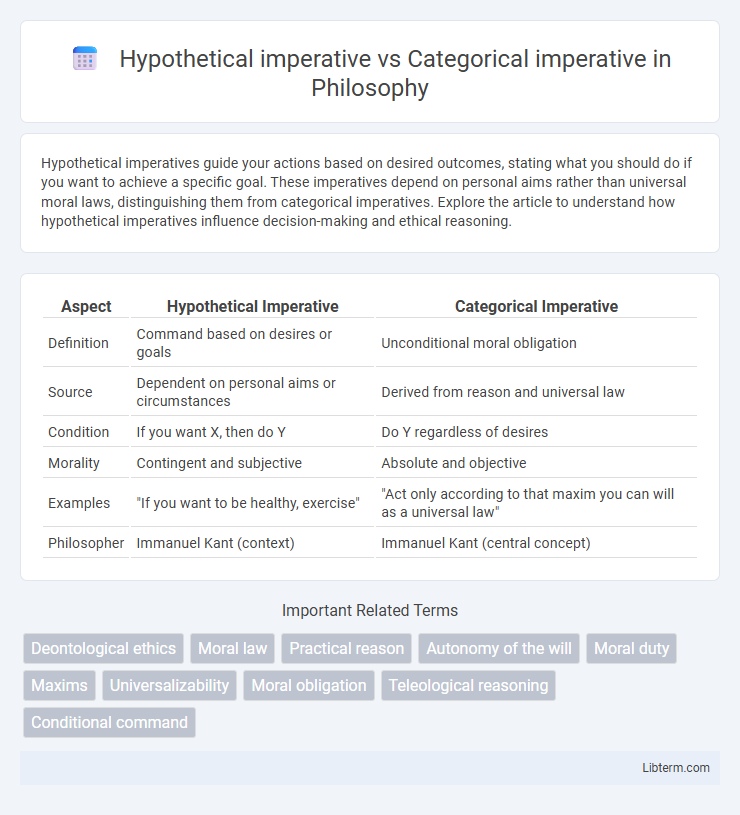Hypothetical imperatives guide your actions based on desired outcomes, stating what you should do if you want to achieve a specific goal. These imperatives depend on personal aims rather than universal moral laws, distinguishing them from categorical imperatives. Explore the article to understand how hypothetical imperatives influence decision-making and ethical reasoning.
Table of Comparison
| Aspect | Hypothetical Imperative | Categorical Imperative |
|---|---|---|
| Definition | Command based on desires or goals | Unconditional moral obligation |
| Source | Dependent on personal aims or circumstances | Derived from reason and universal law |
| Condition | If you want X, then do Y | Do Y regardless of desires |
| Morality | Contingent and subjective | Absolute and objective |
| Examples | "If you want to be healthy, exercise" | "Act only according to that maxim you can will as a universal law" |
| Philosopher | Immanuel Kant (context) | Immanuel Kant (central concept) |
Introduction to Kantian Imperatives
Kantian imperatives distinguish between hypothetical imperatives, which command actions conditional on achieving specific goals, and categorical imperatives, which demand actions universally regardless of personal desires. The hypothetical imperative operates on practical reasoning and depends on subjective aims, exemplified by the rule "If you want to stay healthy, exercise regularly." In contrast, the categorical imperative functions as an unconditional moral law, exemplified by Kant's formulation: "Act only according to that maxim whereby you can at the same time will that it should become a universal law.
Defining the Hypothetical Imperative
The hypothetical imperative is a conditional moral principle that commands an action based on achieving a specific goal or desire, making it contingent on personal objectives. It differs from the categorical imperative, which dictates actions as universally necessary regardless of individual aims. Understanding the hypothetical imperative involves recognizing its role in guiding behavior through means-end reasoning rather than absolute moral laws.
Understanding the Categorical Imperative
The Categorical Imperative, a key concept in Immanuel Kant's moral philosophy, demands actions that can be universally applied regardless of personal desires or goals, contrasting with Hypothetical Imperatives which depend on specific objectives. Understanding the Categorical Imperative involves recognizing its unconditional nature, guiding individuals to act according to maxims that could be consistently willed as universal laws. This concept establishes a foundation for ethical decision-making based on duty and moral law rather than contingent outcomes or subjective preferences.
Key Differences Between Hypothetical and Categorical Imperatives
Hypothetical imperatives are conditional commands that depend on a desired outcome, such as "If you want to stay healthy, you should exercise." Categorical imperatives, by contrast, are unconditional moral duties that apply universally, like "You ought to tell the truth." The key difference lies in their scope and necessity: hypothetical imperatives guide actions based on personal goals, while categorical imperatives demand actions regardless of individual desires or consequences.
Practical Examples of Hypothetical Imperatives
Hypothetical imperatives are conditional commands that depend on a desired outcome, such as "If you want to pass the exam, you should study." For example, a student must complete assignments to achieve good grades or an athlete must train regularly to improve performance. These imperatives contrast with categorical imperatives, which are unconditional moral laws, like Kant's principle to act only according to maxims that could be universal laws.
Real-World Applications of Categorical Imperatives
Categorical imperatives, central to Kantian ethics, demand actions be universally applicable without exceptions, influencing modern legal frameworks and human rights principles by promoting consistent moral duties. Unlike hypothetical imperatives, which depend on individual goals or desires, categorical imperatives establish unconditional obligations such as honesty, respect, and justice, foundational in corporate ethics and public policy. This universality ensures ethical standards transcend personal motives, reinforcing accountability in professional conduct and social governance.
Moral Obligation: Conditional vs. Unconditional
Hypothetical imperatives prescribe actions based on contingent desires or goals, making moral obligations conditional on specific outcomes or personal inclinations. Categorical imperatives, formulated by Immanuel Kant, impose unconditional moral duties that apply universally, regardless of individual preferences or consequences. This distinction underscores that categorical imperatives represent absolute moral obligations, while hypothetical imperatives guide actions only if certain conditions or objectives are present.
Critiques and Limitations of Both Imperatives
Hypothetical imperatives face criticism for their dependency on individual desires, rendering moral obligations subjective and conditional rather than universally binding. Categorical imperatives, while aiming for absolute moral laws, are often challenged for their rigid formalism and lack of practical guidance in complex ethical dilemmas. Both frameworks struggle to address the nuances of moral motivation and the variability of human contexts, limiting their application in real-world ethical decision-making.
The Impact of Imperatives on Ethical Decision-Making
Hypothetical imperatives guide ethical decision-making based on contingent desires or goals, framing actions as means to achieve specific ends, thus making morality conditional on individual circumstances. Categorical imperatives, by contrast, impose unconditional moral obligations that apply universally regardless of personal motives, establishing a foundation for objective ethical principles. The impact on decision-making is profound: hypothetical imperatives encourage flexible, context-dependent choices, while categorical imperatives demand consistency and adherence to duty.
Conclusion: The Relevance of Kantian Ethics Today
Kantian ethics remains relevant today by emphasizing duty and moral law through categorical imperatives that apply universally, unlike hypothetical imperatives, which depend on individual desires. The categorical imperative's focus on treating humanity as an end in itself supports contemporary discussions on human rights and ethical decision-making. This universality and unconditionality provide a robust framework for evaluating moral actions beyond situational preferences.
Hypothetical imperative Infographic

 libterm.com
libterm.com